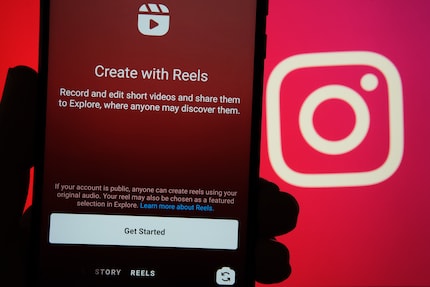
Background information
Meta under pressure – Part 2: how Instagram lost its way
by Samuel Buchmann

Negative headlines surrounding Meta and its Facebook and Instagram brands are piling up. Is Mark Zuckerberg facing his downfall? Part three in a series on the tech giant’s problems.
Let’s run an experiment. Open your default Facebook or Instagram app. Scroll down ten posts, then scroll up and count: how many of the ten posts are «suggested» items?
I ran this test on both platforms on different days, ten times in total. Out of the 100 posts, 18 were suggested to me. Always included are Reels – one-minute vertical short videos. It’s the most important change on Meta’s platforms in a long time. The new feature is called «Discovery Engine». It’s CEO Mark Zuckerberg’s answer to one of the biggest threats to his empire. And it hails from China: TikTok. Welcome to part three in my series on Meta’s problems. If you missed the last episode, you can find it here:
TikTok’s user numbers exploded last year. If you don’t know the app, let me explain it to you briefly: TikTok takes over a job that you usually have to do yourself on traditional social media platforms – choosing what you want to see. While you can follow individual accounts, the lion’s share of content is served to you by algorithms. As a user, you only have to do one thing: swipe up if you want to see the next video.

The more time you spend on TikTok and the more posts you view in their entirety or swipe away beforehand, the more data the platform collects about you. This feeds its algorithms, which can thus better assess which videos interest you. The better the recommendations, the more time you spend on TikTok – an endless vortex that sucks in all your attention. Before you know it, entire afternoons are gone.
Our attention spans are lowering.
This didn't come out of the blue. Sociologist Dr Julie Albright compared TikTok to drug and gambling addiction in an interview with «Forbes» magazine: «[…] they’re exactly like a slot machine. […] It means sometimes you win, sometimes you lose. When you’re scrolling … sometimes you see a photo or something that’s delightful and it catches your attention. And you get that little dopamine hit in the brain … in the pleasure center of the brain. So you want to keep scrolling.» Other social media platforms also work according to this mechanism, but TikTok has perfected the principle of endless scrolling with its algorithms. Excessive consumption can permanently alter the brain, Albright says. «Our attention spans are lowering.»
TikTok’s success is a problem for Meta. Much of the attention that flows to TikTok comes from Instagram and Facebook users. The Chinese short video platform already has over one billion active users. Including the domestic version Douyin, even 1.6 billion. That’s less than Facebook’s nearly 3 billion, but more than Instagram’s 1.44 billion. Particularly troubling for Meta is the trend among teenagers, who are considered trendsetters. According to surveys, TikTok is more popular with that age group than Instagram or Facebook. Only YouTube has been able to stand up to the Chinese platform so far.
The share of algorithmic content on Facebook and Instagram is 15 per cent. It will double by the end of 2023.
But Mark Zuckerberg isn’t giving in that easily. He’s resorting to his tried-and-true strategy: buy or copy. TikTok is too big and too Chinese for an acquisition. Therefore, both Facebook and Instagram have started pushing their own version of short videos in recent months. They’re called Reels, and work on the same principle as TikTok. And content suggested by algorithms isn’t exclusive to Reels either – it’s present in the entire News Feed. At the moment, according to Meta’s data, the share is 15 per cent. By the end of 2023, this will double.
This brings me back to the beginning of this article and the Discovery Engine. Meta’s name for its system of algorithms that serve you «suggested» content. Just like TikTok, Facebook and Instagram collect loads of data about you to feed into the Discovery Engine. You can even actively intervene – take Instagram, for example. There are new ways to flag content that doesn’t interest you. In spite of all these efforts, Meta hasn’t even begun to catch up with TikTok so far. This was revealed in a leaked internal memo. According to the report, users spend just one tenth of the time with Reels on Instagram compared to TikTok.

There are two reasons for this. First, Instagram lacks exclusive content – about a third of all Reels are recycled TikTok videos, immediately recognisable by their watermark. The $1 billion budget to encourage influencers to do more Reels is having little effect so far.
We are an entertainment platform. The difference is significant. It’s a massive difference.
Secondly, TikTok’s algorithms work differently than Meta’s. The latter are based on the so-called social graph of users – i.e. their social connections. For example, a post is more likely to be suggested to you if a friend has already interacted with it. This is anchored in the platforms’ self-image: Instagram and Facebook are traditionally social networks that link their users together. TikTok doesn’t have that restraint. «We are an entertainment platform,» says Blake Chandlee, TikTok’s president of global business strategy. «It’s a massive difference.»
Even if Meta succeeds in being an improved copy of TikTok, the question remains: is this really what users want? A homogeneous social media landscape consisting mainly of one-minute short videos? If key influencers have their way, the answer will be no. «Make Instagram Instagram again,» as I previously quoted Kylie Jenner – the woman with the most Instagram followers – in the last instalment of this series. I used the second part of her post: «Stop trying to be TikTok, I just want to see cute photos of my friends.»
Stop trying to be TikTok, I just want to see cute photos of my friends.
Whether Jenner represents a majority of users with this opinion is hard to say. Personally, suggested posts annoy me – and Reels feel like wasted time to me. Resentment is also growing among my circle of friends about the new direction Meta has taken. This isn’t representative either. But the danger is that Facebook and Instagram will scare away their regular users while simultaneously failing to win back the young target group they’re currently losing to TikTok.
Socially, the rise of algorithmic content is a black box. On the positive side, it’s possible that this will push out borderline and polarising content, among other things. This was given a disproportionately large stage in the past era of «Optimization for Engagement». Meta itself also argues that the Discovery Engine can serve you content and opinions outside your sociocultural bubble and thus broaden your horizons.
Contrast this with concerns about the power of algorithms: as a user, you have less and less influence on what you see. At the same time, content you consume influences your view of the world and your opinions – often unconsciously. Meta’s algorithms have always had unwanted side effects in the past. As the Discovery Engine grows, so will the responsibility placed on algorithms. Deliberate or naive shortsightedness in their development and implementation can have even more serious consequences.
Mark Zuckerberg may be opening a Pandora’s box with the Discovery Engine. In the past, he’s often shifted responsibility for what happened on Instagram and Facebook to users. Freely following the motto: «We’re just the platform – you decide what you do on it.» This line of reasoning no longer works if you no longer select content yourself. If the Discovery Engine causes damage, Meta will be solely responsible.
Content control and moderation will become a core task in this new era – walking a tightrope between removing unwanted content and false censorship. Zuckerberg doesn’t seem comfortable with this role: «I didn’t get into this to judge those things, I got into this to help people connect,» as he said in an interview with Joe Rogan. It’s why he’s trying to outsource decisions to external bodies. They should judge which content disappears into oblivion and which doesn’t – in collaboration with algorithms. Experiments using the latter exist. So far, they’re reaching their limits, figuratively and literally. After all, algorithms are developed by a small group of people living mainly in North America. Systems therefore have problems with languages other than English, for example.
Whether Meta will succeed with its strategy is anything but certain. But in the fight against TikTok, Mark Zuckerberg could get help from an unexpected source: the U.S. government. A member of the Federal Communications Commission (FCC) requested in June that Google and Apple remove the TikTok app from their stores. This hasn’t happened so far, as the FCC has no authority over the app stores. But it shows that U.S. regulators are looking for ways to stop the flow of data to China.

Doubts about TikTok’s privacy have long existed. Critical voices fear that the Chinese state has backdoor access to the data of U.S. citizens via the app. Donald Trump already tried to ban TikTok in 2020 on this basis. The company was able to avert this by committing to store data from U.S. citizens on cloud servers operated by American provider Oracle. News portal «Buzzfeed» revealed in June that U.S. data is nevertheless regularly accessed in China. TikTok itself only responded with vague statements – they’d work with the relevant authorities to find a solution. Calls for government regulation of the app are growing louder. This is further backed up by reports that TikTok doesn’t only record clicks in the in-app browser, but even keyboard strokes:
In light of Meta’s history, it seems ironic that data privacy could be Mark Zuckerberg’s salvation. After all, his company has also regularly been criticised for being negligent with their user data.
What kind of a vacuum a TikTok ban can leave in the advertising market can be seen in India. There, the app already disappeared from app stores two years ago. The government banned it due to security and privacy concerns. As a result, Meta and Google are trying to claim as much of the freed up 20 billion dollar pie as possible.
Who will win the global battle for the most attractive short video platform remains to be seen. For Meta, success is especially vital, as it needs money to develop Zuckerberg’s Metaverse – money that is in danger of becoming scarce. Not just TikTok is responsible for this. There’s another company that’s currently becoming Meta’s nemesis: Apple. More on that in the next episode.
My fingerprint often changes so drastically that my MacBook doesn't recognise it anymore. The reason? If I'm not clinging to a monitor or camera, I'm probably clinging to a rockface by the tips of my fingers.
Interesting facts about products, behind-the-scenes looks at manufacturers and deep-dives on interesting people.
Show all